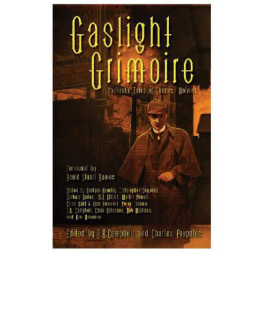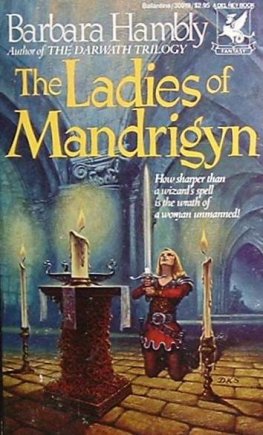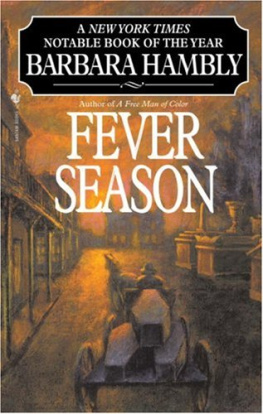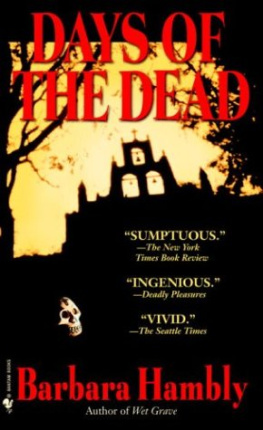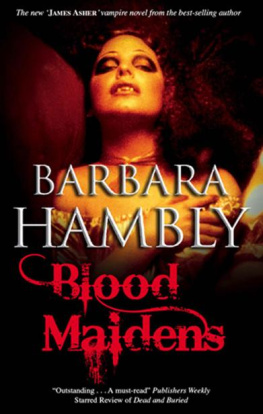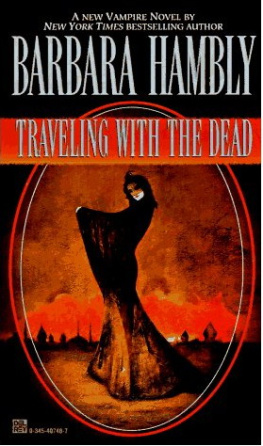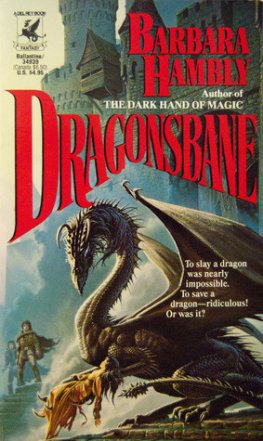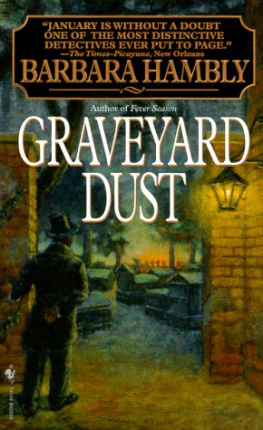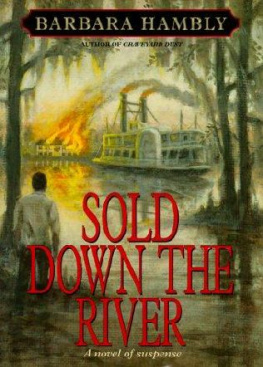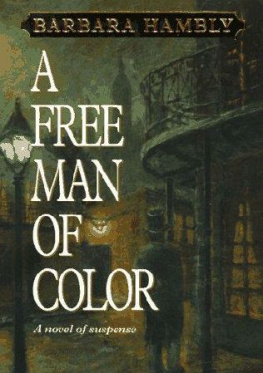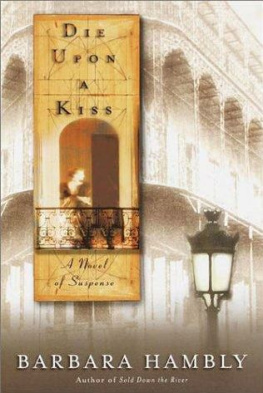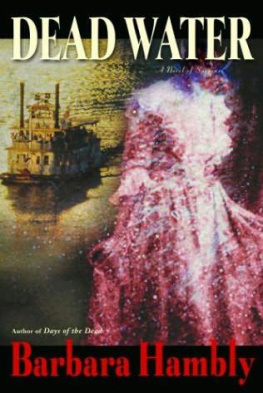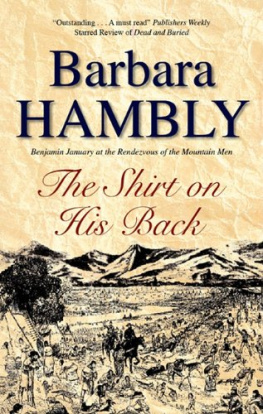Barbara Hambly - 04 Sold Down the River
Here you can read online Barbara Hambly - 04 Sold Down the River full text of the book (entire story) in english for free. Download pdf and epub, get meaning, cover and reviews about this ebook. genre: Science fiction. Description of the work, (preface) as well as reviews are available. Best literature library LitArk.com created for fans of good reading and offers a wide selection of genres:
Romance novel
Science fiction
Adventure
Detective
Science
History
Home and family
Prose
Art
Politics
Computer
Non-fiction
Religion
Business
Children
Humor
Choose a favorite category and find really read worthwhile books. Enjoy immersion in the world of imagination, feel the emotions of the characters or learn something new for yourself, make an fascinating discovery.

- Book:04 Sold Down the River
- Author:
- Genre:
- Rating:5 / 5
- Favourites:Add to favourites
- Your mark:
- 100
- 1
- 2
- 3
- 4
- 5
04 Sold Down the River: summary, description and annotation
We offer to read an annotation, description, summary or preface (depends on what the author of the book "04 Sold Down the River" wrote himself). If you haven't found the necessary information about the book — write in the comments, we will try to find it.
04 Sold Down the River — read online for free the complete book (whole text) full work
Below is the text of the book, divided by pages. System saving the place of the last page read, allows you to conveniently read the book "04 Sold Down the River" online for free, without having to search again every time where you left off. Put a bookmark, and you can go to the page where you finished reading at any time.
Font size:
Interval:
Bookmark:
Benjamin January Book 4
Sold Down the River
Barbara Hambly
For Mom and Dad Special thanks are owed to Paul Nevski, Bill Coble, Norman and Sand Marmillion, and the rest of the staff of Le Monde Creole in New Orleans and Laura Plantation in St. John Parish, for unbelievable help, inspiration, and friendship in putting together this book.
Thanks also to Pamela Arcineaux and the staff of the Historic New Orleans Collection for their patience, friendship, and help; to Laurie Perry for her comments and help on early black music; and to Kate Miciak of Bantam Books.
Thank you also to Jill and Charles, to Neil and Deb, to Michael, and, of course, to George.
PARTIAL GLOSSARY
One of the problems with the terminology found in accounts of slavery-in Louisiana in particular-is that words have often been transcribed phonetically, and spelling differs from account to account. As usual, my research has spanned so many small sources that the spelling is completely inconsistent. I apologize for this.
Arpent-192 linear feet. Plantations were usually measured in arpents of river-front, extending sometimes twenty, sometimes forty arpents back from the river towards the swamps.
Baron Cemetery (also Baron Samedei, or Baron La Croix)-voodoo spirit of the dead.
Batture-the ground between the levee and the actual edge of the water. Frequently heavily wooded, and piled with snags and debris washed up in high water.
Blankittes (or blanquittes)-disrespectfiil term for whites, used by slaves.
Bousillage-river mud mixed with moss, ground shells, straw, hair, or any other binding substance to make a hard plaster. Also, the act or process of making walls out of this material.
Bozal (or bosal)-A slave newly arrived from Africa; in other words, a raw savage.
Brigitte of the Dry Arms-voodoo spirit of death, wife of Baron Cemetery.
Callas-fried rice-balls (frequently dusted with powdered sugar).
Cipriere-the swampy cypress forests that lay behind the cleared plantation lands along the river.
Also called simply the swamp by Americans, and the "desert" by French (meaning "a waste place," not as the word is understood in English).
Congris-mixture of chickpeas and rice, or more broadly (in other parts of the Caribbean), any kind of beans and rice.
Damballah-Wedo (or Damballa-Wedo) -voodoo snake-spirit of water and wisdom. Gar~onniereseparate wing of a plantation or town house where the grown sons of the family lived. Sometimes a separate building.
Griot-African word for the village storyteller, bard, and historian.
Loa-voodoo spirits or "gods." Loa can be great or not-so-great, powerful or minor, dangerous or benign or even comical, though the line between "good" and "bad" spirits is often less sharp in the African religions than in Western: spirits can be summoned to help with good causes or bad.
Osnabrig (or osnaberg)-short for Osnaberg cloth, a coarse heavy cotton manufactured in Osnaberg, Sweden, usually used for slave clothing.
Papa Legba-voodoo spirit of the crossroads, often conflated with St. Peter, the keeper of Heaven's keys. Guardian of the doorways from this world into the next.
Pla?ee-free colored mistress of a wealthy white gentleman. The relationships were usually monogamous and frequently arranged with a contract on business lines.
Quantiers (also quanteers)-a type of extremely coarse rawhide shoes made for slaves by the plantation shoemaker.
Rattoon-to grow cane from stalks planted in a previous season and left in the ground (rather than being dug up and replanted). Rattooned cane tends to come up thinner and is more trouble to harvest.
Ronlaison-cane-harvest and grinding season.
Tignon-the head-scarves or turbans whose wear was mandated by law for all women of color, slave or free.
Veve-voodoo signs or diagrams drawn to summon the loa.
ONE
When someone ties you naked to a tree in the yard and beats you unconscious with a broom handle, you don't soon forget it, or him.
"Ben, you remember Monsieur Fourchet," said his mother.
Standing in the doorway of her parlor, Benjamin January felt the hair lift on his nape at the sight of the man beside the window.
In the nightmares, he was taller.
Fourchet turned from the long French door that looked out onto Rue Burgundy, and January saw that he was, in fact, just slightly under six feet tall: more than three inches shorter than his own towering height. That he was wide through the chest and shoulders, but without January's massive strength. In the nightmares his hair was black, not streaky gray and thin, and his face, although creased with a lifetime's rage and cruelty, didn't have the broken network of lines that gouged the sunken cheeks, bracketed the harsh mouth, accentuated the sag beneath the chin.
The eyes were the same. Arrogant, dark, and cold. But the man had grown old.
"I remember," he told his mother.
"You've grown." Fourchet took a seat in one of the straw-colored chintz chairs of which January's mother was so proud.
Between seven and forty-one I'd belong in a raree-show if I hadn't.
January couldn't resist saying, "Monsieur Janvier fed me very well. Sir."
Fourchet hadn't. The slaves on Fourchet's Bellefleur Plantation, where January had been born, had what were called provision lands, small plots where they could grow corn and yams. On most plantations these augmented whatever rations of cornmeal and salt pork the planter saw fit to distribute. On Bellefleur, Fourchet had skimped the women and the children; even out of harvest time, he had demanded extra work after the conch shell was blown at sunset, so that the provision grounds were neglected and choked with weeds. January remembered his aunts and uncles were always being whipped for stealing food.
Fourchet sniffed. "Educated you, too, so your mother tells me."
By the way the man said the words January knew that Fourchet had had his mother, probably many times in the years before he'd sold her to St.-Denis Janvier. Anger rose in him like vomit, and like vomit he swallowed it down. He glanced at Livia Levesque, slender and beautiful still at sixty-four, neat in her fashionable frock of yellow mull-muslin, on her head the tignon that New Orleans statute required all women of color to wear, striped yellow and white to match, and trimmed with lace. Her slim strong hands in crocheted house-mitts rested easy around the cup of pink-and-green German porcelain that held her coffee, and her dark wide beautiful eyes moved from man to man with an alert calculation that held not the smallest whisper of embarrassment, self-consciousness, or anger in the presence of her former master.
The situation simply didn't bother her at all. "Monsieur Fourchet has come to ask our help, Ben," said his mother. Outside, in the Rue Burgundy, a brewer's dray rattled past, driven far too fast by a young man standing to the reins like a Roman charioteer; two women walking along the brick banquette squealed and sprang aside from the water thrown by the wheels. Even so far back from the levee the hoots of the steamboats could be heard, and the dim stirring of stevedores' shouts and vendors' cries. After summer's gluey horror, the autumn air was crisp. The city was resuming its wintertime bustle and prosperity. "Your name was given him by that dirty American policeman you take up with, but perhaps it's all to the best."
That dirty American policeman was Abishag Shaw, lieutenant of the New Orleans City Guard. Though as a rule-like most of the citizens of the French town, white and colored alike- January mistrusted Americans profoundly, particularly those in positions of power, he liked Shaw and respected him. Still, his mother spoke no more than the truth.
Next pageFont size:
Interval:
Bookmark:
Similar books «04 Sold Down the River»
Look at similar books to 04 Sold Down the River. We have selected literature similar in name and meaning in the hope of providing readers with more options to find new, interesting, not yet read works.
Discussion, reviews of the book 04 Sold Down the River and just readers' own opinions. Leave your comments, write what you think about the work, its meaning or the main characters. Specify what exactly you liked and what you didn't like, and why you think so.

